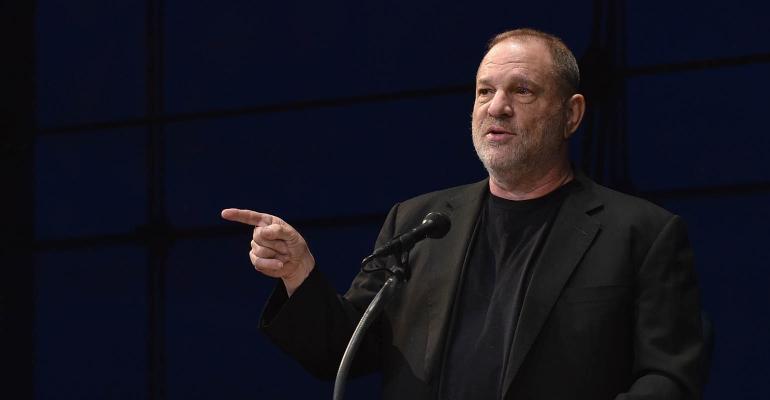(Bloomberg)—Weinstein Co., reeling after firing its co-founder Harvey Weinstein amid sexual assault and harassment allegations, is in talks to potentially sell its movie and television rights to Colony Capital.
Colony Capital, founded by Tom Barrack, has agreed to immediately provide cash to the film studio, according to a statement Monday. No other details of the talks were disclosed. A deal would give the investment firm a stake in shows such as “Project Runway” and award-winning films such as “The Artist.”
“We believe that Colony’s investment and sponsorship will help stabilize the company’s current operations,” Weinstein board member Tarak Ben Ammar said in the statement.
Harvey Weinstein was fired Oct. 8 after the New York Times published an investigation that detailed sexual harassment allegations against him over three decades. The company’s board has said it was unaware of the accusations and last week denied it was exploring a sale or shutdown.
“We will help return the company to its rightful iconic position in the independent film and television industry,” said Barrack.
Brothers Harvey and Bob Weinstein founded Miramax in 1979, then sold it to Walt Disney Co. in 1993. The Weinsteins eventually left, and Disney sold the business in 2010 for $660 million to a group that included a unit of the Qatar Investment Authority -- and Barrack’s Colony Capital.
When Qatar-based broadcaster BeIN Media Group. agreed to acquire Miramax in 2016, Colony made 3.5 times its equity, according to a person with knowledge of the matter who asked not to be identified since the terms aren’t public.
‘Polaroid,’ ‘Paddington’
The Weinstein brothers founded Weinstein Co. in 2005 after leaving Miramax. Their company quickly secured its standing in pop culture, using savvy strategy to accumulate Academy Awards. Weinstein Co. plans to release horror film “Polaroid” on Nov. 22 and “Paddington 2” on Jan. 12.
Barrack, 70, has a net worth of $1.3 billion, according to the Bloomberg Billionaire’s Index. He was chairman of Trump’s inaugural committee.
After founding Colony in 1991, Barrack made much of his fortune by investing in out-of-favor assets, including soured Middle East real estate and bad German real estate loans. His business took a downwards turn in the mid-2000s buyout boom, when multibillion-dollar investments in flashy casinos and trophy properties went south. By 2010, Colony’s flagship private equity fund had lost 60 percent of its value.
Barrack changed tack by backing away from the risky, high-profile leveraged buyouts that made him famous, instead turning to a series of investment vehicles that focus on lending and distressed property debt. He took Colony public with little fanfare in 2015 by merging it with Colony Financial, a publicly traded real estate investment trust.
--With assistance from David Carey.To contact the reporter on this story: Bruce Rule in New York at [email protected] To contact the editors responsible for this story: Crayton Harrison at [email protected] Bruce Rule, Elizabeth Fournier
COPYRIGHT
© 2017 Bloomberg L.P

